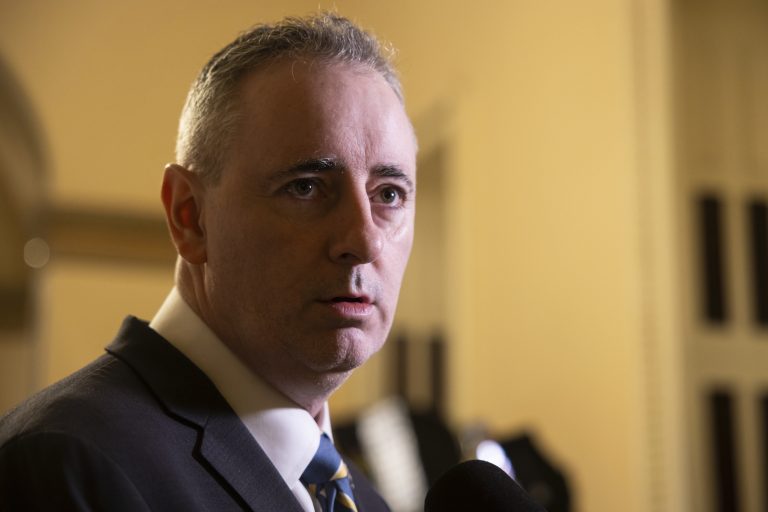A key House Republican moderate is drafting a new bill that would extend soon-to-expire Obamacare subsidies and offer a carrot to try to win over more-conservative GOP colleagues and President Donald Trump.
Rep. Brian Fitzpatrick (R-Pa.), who co-chairs the bipartisan Problem Solvers Caucus, outlined in an interview Friday several elements he is eyeing for the new proposal: an extension of the Affordable Care Act tax credits, with income limits and required minimum premium payments; new flexibility for health savings accounts, a conservative priority aimed at wooing Trump and conservatives; and potentially a stalled bipartisan package overhauling the role of pharmaceutical benefit managers.
Fitzpatrick, who has been working with fellow GOP centrists who are desperate to address the subsidy cliff, said it was “our hope” that they would soon introduce a bill encompassing those provisions.
“We’re going to have to move quickly,” he said.
The proposal would be competing with multiple alternatives from conservative Republicans who are proposing to at least partially end the federal subsidies for plans purchased on Affordable Care Act exchanges, replacing them with individual accounts that they say would give Americans more flexibility to purchase health care.
Fitzpatrick and his allies are open to moving toward more flexibility for HSAs, but they don’t want to allow the Obamacare tax credits to expire as well. Some in the group strongly believe they need to focus on extending the existing subsidies first, then develop a broader health care overhaul.
Fitzpatrick, Rep. Don Bacon (R-Neb.) and several other Republicans in the Problem Solvers group spoke about their health care plans during a private dinner Thursday night. Bacon rolled out a separate bipartisan plan Friday with GOP Rep. Jeff Hurd of Colorado and Democratic Reps. Tom Suozzi of New York and Josh Gottheimer of New Jersey that would extend the subsidies for two years, albeit with new restrictions on eligibility.
But Fitzpatrick said that, based on conversations with colleagues, more than an extension will need to be included in order to attract a critical mass of GOP votes. Trump and top House GOP leaders have signaled they are opposed to continuing the ACA tax credits, and scores of House Republicans have signaled the same.
House Majority Leader Steve Scalise, asked about the centrist Republicans’ aims in an interview Friday, said GOP leaders had other plans. He indicated Republicans are planning to bring legislation dealing with HSA flexibility, the PBM overhaul, cost-sharing reductions and other conservative policies to the floor in the coming weeks — but not an ACA tax-credit extension.
“There are a lot of really good ideas that we’re going to be bringing to the floor for votes that lower premiums for families, bring more transparency and more options for families,” he said.
When asked if GOP leaders believe it’s tenable to allow the subsidies to expire, letting those other policies fill the gap, he replied: “We don’t have all the final things agreed upon, and we will work through it with our whole conference.”
The House GOP centrists feel left in the lurch by their own leaders, who have followed the lead of more conservative factions in advocating for the subsidies to expire. But they’ve also been angered by moderate Democrats, who they say are insisting on first sketching out a larger “framework” for negotiations.
Democrats have been cool to the GOP proposals that would substitute individual spending accounts for the existing subsidies, arguing that they would not fully fill the financial gap for many Americans and could destabilize health insurance markets.
One House Republican who was at the Thursday night dinner said colleagues spent a large portion of the evening kvetching about Democrats, whom they remain angry at after the lengthy government shutdown.
“We’re past talking about frameworks,” said another House Republican, who was granted anonymity to speak candidly about the internal discussions. “This is an emergency.”

